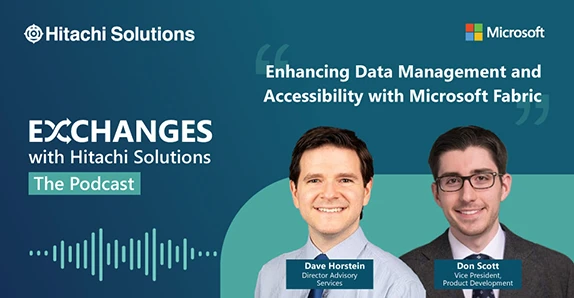On-Demand Webinar: The AI Freeway: Helping Business Leaders Take an Optimal Onramp for Outcomes Now!
One of our most downloaded episodes in season 3 of Exchanges, this previously aired podcast was recorded before Microsoft Fabric became available last fall — introducing business leaders to the value of Fabric and how Lumada Empower can help prepare your analytics estate. Check out why it resonates with so many or our listeners!
How will this episode help me?
In this episode, Hitachi Solutions Advisory Expert Dave Horstein walks through the business use case for Microsoft Fabric with Chief Technology Officer Luke McGrath and Empower Modern Data Platform Developer Don Scott. They talk about what Fabric means for your enterprise, and how Hitachi Solutions is particularly T-d up to help our customers surface the value of the technology today.
Problem Statement: Current data management solutions pose numerous challenges. Consolidating data into one place requires significant investment in technical capabilities, either through the hiring of external consultants or the upskilling of internal resources. The ongoing management and maintenance of these data environments are also cumbersome. Moreover, the penetration of data and analytics into the market has been poor, leaving many potential users unable to operate tools such as data warehouses.
Proposed Solution: Microsoft Fabric streamlines data management by consolidating all data sources into one spot, with sophisticated behind-the-scenes processing. This solution connects various storage assets, such as AWS S3 buckets and Azure Data Lake Store, enabling businesses to access their data where it lives, thereby avoiding the need for pipelines to move data around.
Benefits: Microsoft Fabric promises to shrink the time-to-value in data and analytics projects, thereby increasing the return on investment. It will enable businesses to be up and running with their data environments within days instead of the typical four to six weeks.
Additionally, Fabric supports the democratization of data projects by bringing information to the fingertips of users more quickly and easily. This could potentially unlock significant potential in the marketplace, allowing businesses to innovate in areas such as product design, supply chain management, and market presence.
Dependencies: The successful implementation of Fabric depends on businesses’ willingness to adapt to new technologies and to invest in upskilling their workforce. As these tools become more ubiquitous, businesses that fail to adopt these technologies risk being left behind.
To learn more how Microsoft Fabric unifies your data estate, register for our upcoming live, expert-led webinar!
